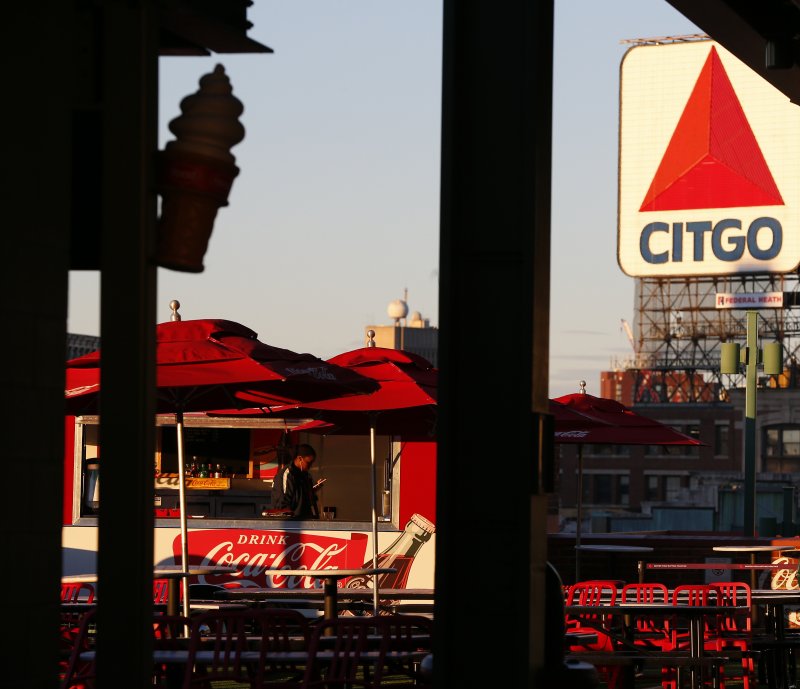The iconic Citgo sign is seen beyond the outfield at Fenway Park in Boston on October 13, 2018. Citgo Petroleum Corp. is the refining arm of Petroleos de Venezuela SA, or PDVSA, the state-run oil company. Photo by CJ Gunther/EPA
Jan. 24 (UPI) -- An unexpected rise in U.S. crude inventories offset fears of potential risk to Venezuelan crude supply because of possible sanctions.
On Thursday, March West Texas Intermediate crude fell 3 cents, or 0.08 percent, and was at $52.66 a barrel on the New York Mercantile Exchange around 10:00 a.m. EST. March Brent crude was at $60.94 a barrel on ICE Futures Europe, down 20 cents, or 0.33 percent.
The American Petroleum Institute said Wednesday that U.S. crude inventories rose by 6.6 million barrels in the latest week compared with expectations of a drop of 42,000 barrels. The U.S. Energy Information Administration' official figures will be released later Thursday.
Prices climbed earlier Thursday after the United States said Wednesday it could impose sanctions on Venezuela's crude exports and is recognizing Venezuela's opposition leader Juan Guaido. He had declared himself interim president, prompting socialist Nicolas Maduro, the country's leader since 2013, to break relations with the United States. Maduro gave U.S. diplomats 72 hours to leave the country.
The United States can also sanction countries doing business with Maduro.
In October 2018, the United States imported about 17.7 million barrels of crude oil and petroleum, according to the Energy Information Administration.
"With the possibility of a Trump oil sanction [on Venezuela], [U.S.] Gulf Coast refiners that depend on heavy crude may have to look elsewhere," James Williams, energy economist at WTRG Economics, told Marketwatch.
Phil Flynn, senior market analyst at Price Futures Group, said the situation "could lead to a war."
Under Hugo Chavez, who was Venezuela's president from 1999 to 2013 and predecessor to Maduro, production dropped by about two-thirds.
White House officials earlier this month warned U.S. refiners to seek alternative sources of heavy crude.
Citgo Petroleum Corp. is the refining arm of Petroleos de Venezuela SA, or PDVSA, the state-run oil company. In the first 10 months of 2018, Citgo imported the most Venezuelan crude followed by Valero Energy Corp., Bloomberg reported.
Venezuela's state-run oil company accounts for more than 90 percent of its export earnings. But more than 80 tankers are waiting offshore for oil because PDVSA is nearly a month behind in shipping crude to customers.
"If oil prices continue to go up, it becomes a domestic political issue that the Trump administration does not want to deal with," Michael Shifter, president of the Washington think tank Inter-American Dialogue, told The Washington Times.
Since the U.S. imposed financial sanctions against Venezuela and PDVSA in 2017, Royal Dutch shell Plc and Philips 66 haven't processed Venezuelan crude. And Marathon Petroleum Corp., Total SA and Motiva Enterprises LLC cut output by more than 50 percent since then.
Elsewhere, Mexico has increased shipments to the U.S. Gulf and has surpassed Venezuela as the region's top supplier. On the U.S. West Coast, Ecuador and Colombia ship crude oil.















